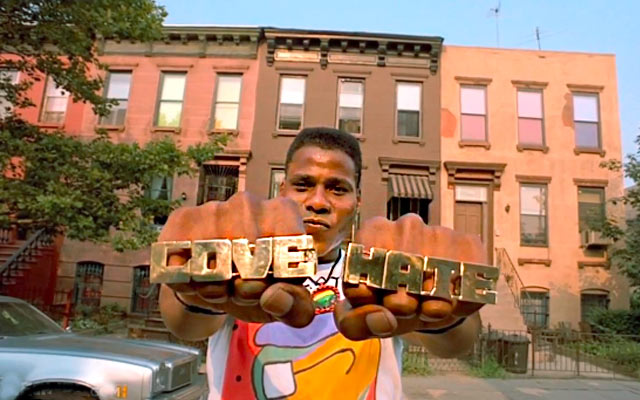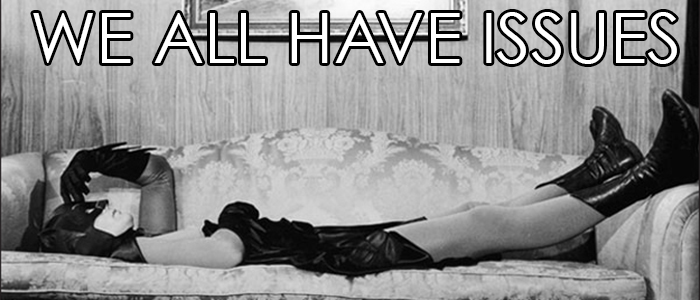The Spike Lee joint Do the Right Thing is a quarter of a century old, but it might be more important than ever right now.
Many of you might have watch the events of a hot day in Bed-Stuy unfold in an air conditioned theater, some rented it on VHS, or, like me, you watched it for the first time just last year. Whenever or however you watched Do the Right Thing, one thing is for certain, it has stuck with you.
After first watching Spike Lee’s 1989 classic, I immediately started it over again, knowing I had seen a film that could teach me about the art of filmmaking, but more importantly, about a part of America that I had been blissfully unaware of.
I’ve lived in the Western part of Kansas for most of my life. A section of the country where high schoolers, like myself, felt justified in telling racist jokes because “we have a black friend”, felt cheated in athletics because the other team wasn’t completely white like ours. A place that clings to the idea of “reverse-racisim”.
Does every single person in this part of the country think like that? Of course not. But, it is prevalent and I’ll admit to having been part of the problem.
A quarter century has passed since Do the Right Thing was first showing in theaters, but it’s message and story seem more on point than ever as one week ago a young, unarmed black man was shot to death in the middle of the street in the middle of the day by a white cop in Ferguson, Missouri. Protests, looting, the deploying of a militarized police force, tear gas, rubber bullets, surveillance footage, and, eventually, the releasing of a name have followed since the shooting of Michael Brown.
Within myself though, a change has occurred, something has finally clicked.

On the surface Lee’s Bed-Stuy looked like a place that was carrying along just fine, especially to a young, white male from the Mid-West. Different ethnicities were co-habitating with shops on the corner that seemed to want to help the citizens. However, as the story evolved you saw there was distrust among the different racial groups.
But, there is a larger issue than that lurking beneath the surface in Do the Right Thing that I didn’t understand until the events in Ferguson: the systematic oppression of minorities.
Did Mookie do the right thing by throwing the trash barrel through Famous Sal’s after Radio Raheem was chocked to death by a police officer? I think Mookie did the only thing that was possible to stop an escalation of violence and the potential loss of more lives.
Mookie understood that the black citizens of Bud-Stuy weren’t guaranteed the same civil liberties that the white citizens of the city took for granted.
Mookie understood that no internal investigation would be opened in the police force.
Mookie understood that the angry citizens around him had very few options to receive justice for the murder that just took place.
Above all though, Mookie understood that destroyed property can be rebuilt, but when a human life is destroyed it is gone forever.
Am I condoning looting? Absolutely not. I believe peace is the best course to follow to enact change in this broken system in America, but I now better understand where the desire to take a more destructive approach comes from.
Yet, I can never fully understand. I can stand with the oppressed to try and help further the cause of equal treatment for all, but I will never know what it feels like to be profiled by the color of my skin. Never know what it feels like to have the weight of the system bearing down on me, suppressing my rights of freedom of speech or the right to due process.
Even now I realize that I am focusing more on the actions of Mookie instead of root cause of the situation which was, and still is, a police officer taking the whole judicial system into his hands and leaving another body in the street.
What can be done to fix this problem? I honestly don’t know. I will look to the leaders around the country that are more involved in these problems to read what they have to say and follow their example.
I do know one thing though; no longer will I wonder if Mookie did the right thing, but I will forever be thinking, “What can I do to help make sure no more Radio Raheems, Michael Browns, or Eric Holders are laying dead in the street by the hands of a police officer?”




4 Comments
It is hard to talk about your own history, particularly when it is not flattering. Like you I grew up in a community that had entrenched racist attitudes towards the various minority populations in the city. It takes a while to shake that stuff when you grow up around it. I’m glad my parents were always quick to stamp it out whenever they heard us say something out of line. This was not the typical type of post on Major Spoilers, but I think it’s important to put out there. It’s awesome you tied this back to your experience with Zach on Film. Not an easy thing to discuss by any means.
Great article, Zack. Absolutely spot-on. Thanks for doing this.
I like where your head is. It becomes increasingly difficult to explain to my African American son that he has to be oh so much more careful around white people than my other sons. I hate it… but I must prepare him for the nut jobs of the world whether they be police, thugs, or simply bigots.
Very good points of view Zach. Remember, Do The Right Thing is just a movie…to live it is far different than filming it.
I grew up in Bedford-Stuyvesant area of Brooklyn (lived in Brownsville, East Flatbush and Crown Heights) during the 1970s and early 1980s. I have had NYPD office place his gun to back of my head (at the age of 11/12), I was unarmed and FAR from a threat to anyone.
I disagree with the comment made by Steve Woolf, regarding his son (“African-American”: reminds of the lyrics to a song by KRS-ONE ‘…not quite ‘American” but getting there very slowly). “nut jobs” have no color, sex, race or creed…they just crazy. I TRY to teach my children to BE AWARE of your surroundings (people, places and things). But they are MY children, so why should they listen to me.
The key to getting past racism (or classism) is be to knowledgeable, have meaningful honest discussion and to LISTEN. We all have a point of view worth seeing/hearing.